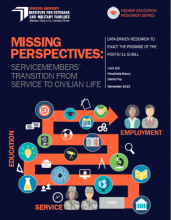By the Numbers - Nov. 23, 2015
1,088,411
The number of Veterans who have used GI Bill higher education benefits as of 2014, according to a new report from the Institute for Veterans and Military Families (IVMF) at Syracuse University -- Missing Perspectives: Servicemembers Transition From Service to Civilian Life.
While this sounds like a very large number -- representing about $12 billion per year, covering higher education/training/licensing/credentialing programs -- it actually includes less than half of eligible Veterans, according to the report.
The IVFM research -- which surveyed about 8,500 Service members (active duty, National Guard and Reserves, Veterans, and some families) -- found that the number one problem/barrier to pursuing education was lack of financial resources (56%). Other issues included personal/family obligations (28%), expiration of GI Bill benefits (25%), health/disability problems (23%), and conflict between work and school (22%).
Among those actively pursuing higher education, according to the survey, the top five problems were:
- Age differences with other students (37%)
- Lack of financial resources (32%)
- Working full time jobs (32%)
- Family responsibilities (29%)
- Few veteran resources on campus (26%).
Additionally, more than one in five Veterans in college indicated discomfort sharing their military background on campus.
All of these issues notwithstanding, 92% of those surveyed "indicated that education should play a role in their post-service transition."
Are you a behavioral health provider working in a university or college community? The Center for Deployment Psychology's University Counseling Center Core Competency (UC4) program offers valuable and engaging training in an in-person full-day presentation comprising interactive, didactic, and workshop components that address:
- The culture and experience of Service members and veterans on campus
- The deployment cycle and its impact on students
- Reintegration on campus
- An overview of treatments for PTSD on campus
- Culturally competent clinical interventions with student veterans
1,088,411
The number of Veterans who have used GI Bill higher education benefits as of 2014, according to a new report from the Institute for Veterans and Military Families (IVMF) at Syracuse University -- Missing Perspectives: Servicemembers Transition From Service to Civilian Life.
While this sounds like a very large number -- representing about $12 billion per year, covering higher education/training/licensing/credentialing programs -- it actually includes less than half of eligible Veterans, according to the report.
The IVFM research -- which surveyed about 8,500 Service members (active duty, National Guard and Reserves, Veterans, and some families) -- found that the number one problem/barrier to pursuing education was lack of financial resources (56%). Other issues included personal/family obligations (28%), expiration of GI Bill benefits (25%), health/disability problems (23%), and conflict between work and school (22%).
Among those actively pursuing higher education, according to the survey, the top five problems were:
- Age differences with other students (37%)
- Lack of financial resources (32%)
- Working full time jobs (32%)
- Family responsibilities (29%)
- Few veteran resources on campus (26%).
Additionally, more than one in five Veterans in college indicated discomfort sharing their military background on campus.
All of these issues notwithstanding, 92% of those surveyed "indicated that education should play a role in their post-service transition."
Are you a behavioral health provider working in a university or college community? The Center for Deployment Psychology's University Counseling Center Core Competency (UC4) program offers valuable and engaging training in an in-person full-day presentation comprising interactive, didactic, and workshop components that address:
- The culture and experience of Service members and veterans on campus
- The deployment cycle and its impact on students
- Reintegration on campus
- An overview of treatments for PTSD on campus
- Culturally competent clinical interventions with student veterans

